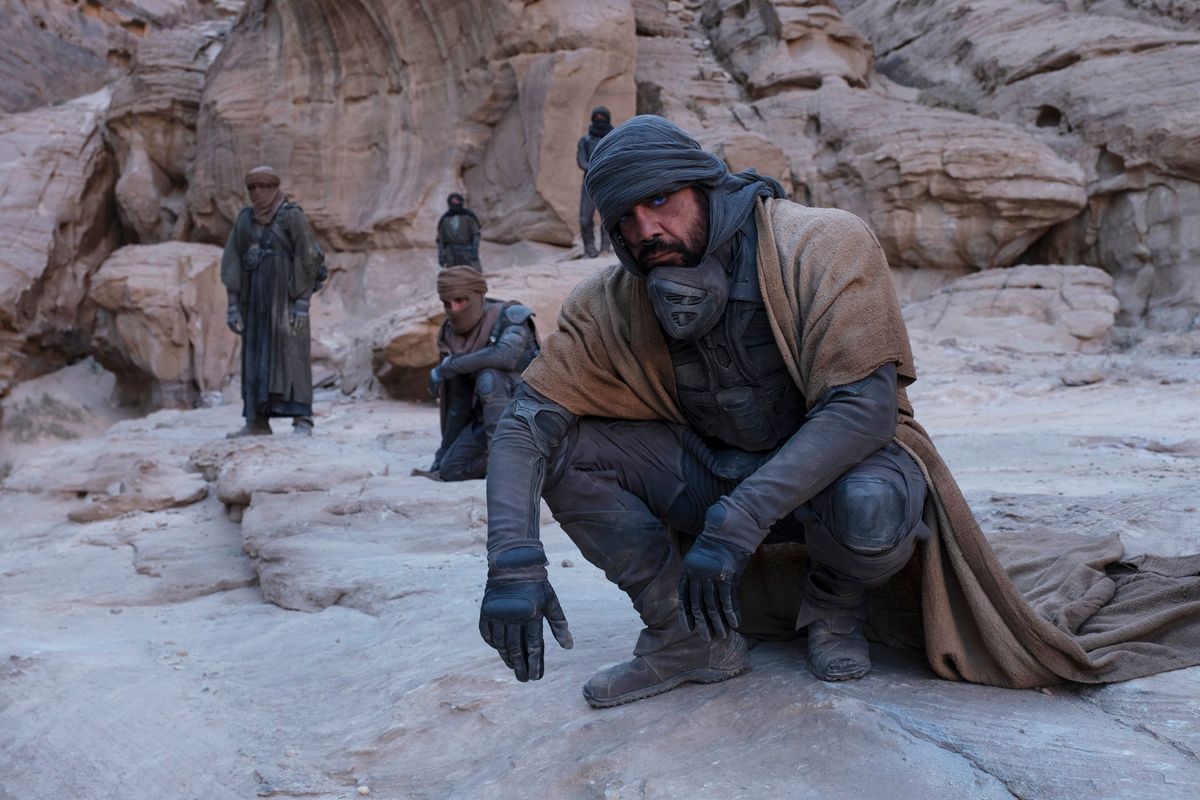Did the 2021 film adaptation of “Dune” miss the mark?

A few minutes every morning is all you need.
Stay up to date on the world's Headlines and Human Stories. It's fun, it's factual, it's fluff-free.
Denis Villeneuve’s 2021 film adaptation of “Dune” has garnered approval from the majority. But despite Hans Zimmer’s dramatic score, the beauty of Arrakis and compelling scenes, some longtime “Dune” fans and “Dune” inductees alike have issues with the film.
Frank Herbert’s sci-fi epic “Dune” chronicles the life of Paul Atreides, burgeoning religious prophet and heir to a dukedom, as he lives among Indigenous peoples on the desert planet Arrakis and prepares to wage a jihad against imperial forces. Any director would understandably struggle to accurately depict this dense space opera and its intricate worldbuilding.
For the sake of the viewer’s sanity, it’s logical to condense the complicated background, such as the Spacing Guide and the CHOAM company. However, some fans feel that Villeneuve nixed too much, creating yawning plot holes. Furthermore, some assert that not only did Villeneuve cut out vital context, but he fell short in terms of casting, pacing and more.
“[The] story did not have enough time to develop,” says Alexander Reeves, a self-proclaimed fantasy geek. “And yes, I know there’s a second movie coming out … but I still feel like certain parts of the film would have developed better if the film was 25 minutes longer.
“I wouldn’t mind a 3-hour film. I know how dense this story is. Also, because this is such a long story, and because there’s a second part coming out, I didn’t enjoy that no-ending feeling. The story ended approximately third-way into the book, but it was so frustrating not being able to give it a finale.”
Although the 2021 film is easily considered a success according to the majority, not all “Dune” fans are raving. Read on as we unpack what could have been better for Villeneuve’s adaptation.
Timothee Chalamet is older than Paul
Some adaptations can get away with noticeable age differences between the character and the actor. However, Paul Atreides begins “Dune” as a precocious 15-year-old. His youth is central to the plot of “Dune.” Other characters underestimate Paul due to his young age. When characters discover his acute intelligence and maturity, they’re unsettled. The stark contrast between Paul’s youth and his level of intelligence plays a central part of how “Dune” unravels. It’s one of the reasons he survives.
However, Timothee Chalamet was 22-years-old while filming “Dune.” Chalamet could reasonably play an 18-year-old Paul in Villeneuve’s “Dune: Part 2,” scheduled to arrive in 2023. But the eight year age gap between the character and the actor in “Dune: Part One” abandons a key aspect of Herbert’s story.
Villeneuve has commented on the age difference between the main character and casting choice Timothee Chalamet: “Paul is an old soul, but in the book he is 15, 16 years old. Timothee was 22, 23 when we shot the movie, so he’s a bit older, but on camera he looks like a teenager. So that was the perfect combination for Paul Atreides.”
Despite this perspective, some fans may feel that a younger actor would have better portrayed the key youthfulness to Paul’s character development and storyline.
Villeneuve’s depiction of Arrakis and The Fremen contributes to cultural erasure
Sunni, Padishah, Lisan al Gaib, Mahdi and jihad. Herbert scatters these words throughout his novel. All are derived from Islamic tradition and Middle Eastern language. Yet Villeneuve’s “Dune” pays scant attention to them or leaves them out altogether.
The Fremen are meant to be a futuristic interpretation of Arabic peoples. Yet, the creators of the 2021 film adaptation of “Dune” blur the identity of the Fremen into a generic group of people of color. None of the actors for the Fremen identify as Middle Eastern or North African. “It’s an erasure,” says Serena Rasoul, a casting director and founder of Muslim American Casting.
Even the music contributes to a blatant cultural erasure. Hans Zimmer composed the music using an Arabic ululating vocal technique, but he avoids acknowledging these influences. Likewise, his use of the Armenian instrument duduk feels appropriative in a culturally generic setting, especially given that the instrument is coded as “exotic” or “ethnic” in Hollywood.
Why does it matter? “Dune” is all about colonization. The movie disrupts Herbert’s allegory of oil disputes in the Middle East, the fall of the Ottoman Empire, and Western imperialism’s rampant exploitation.
The audience didn’t have time to empathize with or understand House Atreides before the siege
The House Harkonnen siege happened so quickly that audiences felt little to no empathy for House Atreides. Nor did they have enough information to understand the politics behind the siege and how it occurred.
First of all, it’s crucial to understand that the Atreides army is galactically renowned, so much so that it threatened the Emperor and provoked a veiled attack. The movie failed to communicate their skill, both in exposition and action. Second, Dr. Yeuh’s betrayal and the reasoning behind it spurs the bulk of the plot in Herbert’s book.
House Atreides becomes aware of a traitor in their midst, and several resulting misunderstandings highlight the relationship dynamics between key characters (including Lady Jessica and Duke Leto). While the movie offers an unconvincing throwaway line about Dr. Yeuh’s motivation, the book provides insight into his character via a few emotional scenes about his wife.
Lady Jessica’s characterization falls short of the novel
Villeneuve’s expansion of the character of Lady Jessica in the film adaptation of “Dune” is perhaps a move to “foreground femininity.” Villeneuve explains, “Femininity is there in the book, but I thought it should be up front. I said to [co-writers] Eric [Roth] and Jon [Spaihts], ‘We need to make sure that Lady Jessica is not an expensive extra.’ She’s such a beautiful and complex character.”
However, not all fans are on board with the differences in these versions of Lady Jessica or this interpretation of “femininity.” Herbert’s Lady Jessica rarely betrays her emotions. She’s striking, both physically and mentally. She intimidates trained soldiers into awed submission. Lady Jessica even defies the powerful Bene Gesserit and its centuries-old breeding program by giving birth to a son.
Villeneuve’s Lady Jessica is beautiful but not striking. Her subtlety suggests meekness, not quiet strength. Though she has moments of fear in the book, Lady Jessica remains an unwavering force, while the 2021 film adaptation of “Dune” has her quaking in fear at every turn.
The lack of context begets too many questions
Audience members who had not read “Dune” required more exposition. The lack of context confused sci-fi fans who expected the usual presence of computers and artificial intelligence. The plot of Herbert’s book occurs after purging the universe of such technology, which Villeneuve omits.
“Dune’s” world functions purely on analog technology, the hallucinogenic properties of spice and people trained at birth to obtain superhuman capabilities (known as mentats). The role of mentats is also curiously absent from the movie, but it showcases their capabilities through characters like Thufir Hawat. At the beginning of “Dune: Part One,” Hawat’s eyes glaze over, and he makes an inhuman calculation, all without explication.
Have a tip or story? Get in touch with our reporters at tips@themilsource.com




Comments ()